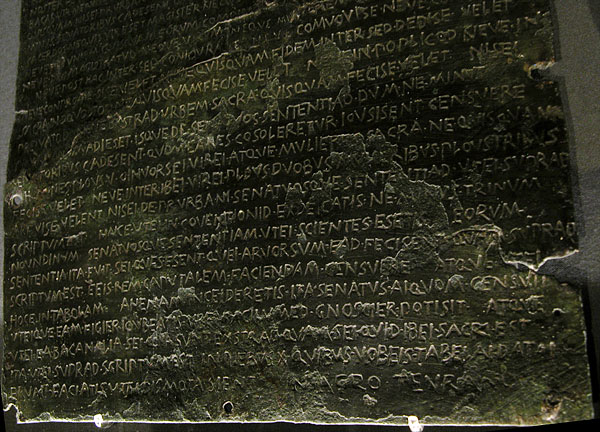Titus Livius, Ab Urbe Condita XXXIX: Hispala
Faecenia

Relief of Bacchic masks, 20 BCE-50 CE |
Women are central to the story Livy tells at length in
AUC Book 39, but they remain very much in the background, working
through men who were the public actors in the state effort to outlaw the
"Bacchanalian Conspiracies" in 186 BCE. The cult was supposedly started by a
Greek immigrant in Etruria and quickly spread through Italy. Its secret rites -
night-time celebrations involving both sexes and the use of wine - and rumored
practices - murders, forgeries, and stolen wills - were considered a major
threat to Rome's security. Whether history or legend, Livy's tale illustrates
the interplay of forces that were frequently in opposition in Roman life -
civic and domestic, privileged and voiceless, male and female. Describing the
cult as originally a "woman's religion" (13.8), Livy presents two very different women: the
vicious mother of Publius Aebutius, Duronia, who put her son's life in jeopardy
for the sake of her second husband, Titus Sempronius Rutilus, and Hispala
Faecenia, whom Livy calls scortum nobile libertina, a timid heroine who
reveals the cult secrets first to her lover for his safety and then to the
consul Albinus under threat of punishment. Other women who are credited for
their assistance are: Aebutia, the paternal aunt of Aebutius, proba et
antiqui moris femina (11.5 ), who directs her nephew to report the
conspiracy to the consul; Sulpicia, the consul Albinus' mother-in-law,
nobilis et gravis femina (12.2), who questions Aebutia on behalf of the
consul and assists his interview with Hispala Faecenia; and finally Paculla
Annia, the Campanian priestess responsible for turning the Bacchic rites into
violent orgiastic celebrations with young male initiates.
Chapter 9: Although Livy treats
the episode as a serious threat, the depiction of Hispala Faecenia is
reminiscent of the stereotype of the "golden-hearted courtesan" of New Comedy.
She takes the young Aebutius under her wing, reversing the usual male-female
roles, and, although he is her tutor under law (Gaius,
Institutiones 1.144 ff. ), she proves to
be his protector.
| (5)
Scortum nobile
libertina Hispala Faecenia, non
digna
quaestu, cui
ancillula
adsuerat, etiam postquam
manumissa erat, eodem se
genere
tuebatur. |
| (6)
huic
consuetudo
iuxta
vicinitatem cum Aebutio fuit, minime adulescentis aut
rei
aut famae
damnosa:
ultro enim amatus
appetitusque erat, et
maligne omnia
praebentibus
suis
meretriculae
munificentia
sustinebatur. |
| (7)
quin
eo
processerat consuetudine capta, ut post
patroni mortem, quia in nullius
manu erat,
tutore ab
tribunis et
praetore
petito,
cum
testamentum faceret, unum Aebutium
institueret
heredem. |
Chapter 10: Aebutius tells
Hispala that his mother has pledged his initiation into the Bacchic mysteries
in gratitude for his recovery from an illness. Horrified, Hispala tells him he
would be better off dead; reluctant to accuse his mother of malice toward him,
she insists that his stepfather, who has been the guardian of his estate, is
certainly trying to destroy him. Aebutius' disbelief requires her to explain
how and what she knows about the cult as she begs the gods' forgiveness for
revealing their secrets.
| (5)
Ancillam se ait dominae comitem id
sacrarium
intrasse, liberam numquam eo accessisse. |
| (6)
scire
corruptelarum omnis generis
eam
officinam esse; et iam
biennio
constare
neminem
initiatum ibi maiorem annis viginti. |
| (7)
ut
quisque
introductus sit,
velut victimam
tradi
sacerdotibus. eos
deducere in locum, qui
circumsonet
ululatibus
cantuque
symphoniae et
cymbalorum et
tympanorum
pulsu,
ne
vox quiritantis,
cum
per uim
stuprum inferatur,
exaudiri possit. |
| (8)
orare inde atque
obsecrare, ut eam rem quocumque modo
discuteret nec se
eo
praecipitaret, ubi omnia
infanda
patienda primum, deinde facienda essent. |
| (9) neque ante
dimisit eum, quam fidem dedit adulescens ab his
sacris se
temperaturum. |
Chapter 18: Aebutius reports
the cult to Albinus, the consul, who asks Hispala to give testimony that leads
to the implication of more than seven thousand men and women. The cult
practices were ruthlessly suppressed through a combination of punishments and
decrees enacted in 186 BCE by a shocked Senate, with the approval of the Roman
assembly and under the joint leadership of the consuls Spurius Postumius
Albinus and Quintus Marcius Philippus. Some committed suicide as soon as the
popular assembly approved the Senate's ban. An effective round-up of cult
members followed. Men and women were imprisoned or killed, depending upon the
extent of their participation in the corrupt practices. Men were punished by
the state, women by male relatives who had authority over them. A
bronze copy of the decree Senatus Consultum de
Bacchanalibus (CIL I.2.581), the oldest
surviving decree of the Roman Senate, was found in Calabria in the 17th
century.
| (6) mulieres
damnatas
cognatis, aut in quorum manu essent, tradebant, ut
ipsi in privato
animadverterent in eas: si nemo erat
idoneus
supplicii
exactor, in publico animadvertebatur. |
Chapter 19: Hispala Faecenia
and Publius Aebutius were rewarded for their service to the state. By decree of
the Senate, confirmed by the popular assembly, each was given an amount of
money equal to the first census class (100,000 copper asses). In addition,
Aebutius was exempted from military service and Hispala was awarded
extraordinary citizen woman privileges that had been closed to her by reason of
her former lifestyle, and received the protection of the
state.
| (5)
utique Faeceniae Hispalae
datio,
deminutio, gentis
enuptio, tutoris
optio
item esset,
quasi
ei
vir testamento dedisset; utique ei
ingenuo
nubere
liceret,
neu
quid
ei
qui eam duxisset ob id
fraudi
ignominiaeve esset; |
| (6) utique consules praetoresque, qui nunc essent
quive postea futuri essent,
curarent, ne quid ei mulieri
iniuriae fieret, utique tuto esset. |
Click on the underlined words for translation aids and
commentary, which will appear in a small window. Close the small window after
each use.
Ann R. Raia and
Judith Lynn Sebesta
Return to
The World of Religion
April 2006

